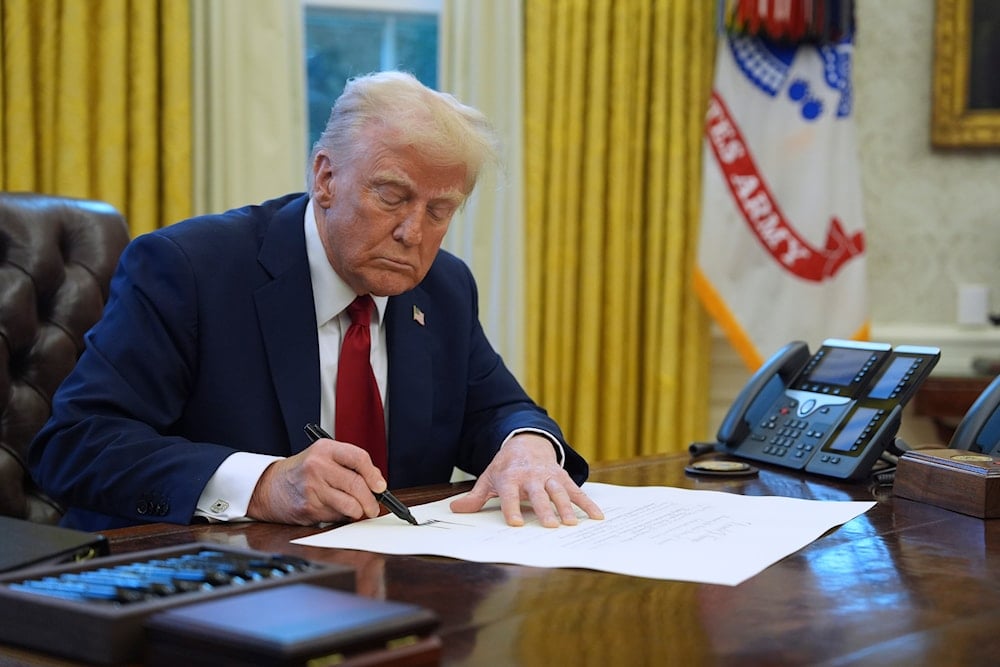Trump announces 25% tariffs on Canada, Mexico take effect Tuesday
US President Donald Trump confirms that reciprocal tariffs would be introduced on April 2 against countries imposing duties on US products.
-

President Donald Trump signs a document in the Oval Office at the White House, Jan. 30, 2025, in Washington. (AP)
US President Donald Trump announced on Monday that Canada and Mexico have no way to avoid the implementation of 25% tariffs set to take effect on Tuesday, rattling financial markets amid concerns over new trade barriers in North America.
"They’re going to have to have a tariff," Trump stated at the White House. "So what they have to do is build their car plants, frankly, and other things in the United States, in which case they no tariffs." He added that there was "no room left" for a deal to prevent the tariffs by addressing fentanyl flows into the US.
Trump also confirmed that reciprocal tariffs would be introduced on April 2 against countries imposing duties on US products.
Following his remarks, US stock markets took a hit. The Dow Jones Industrial Average dropped by 1.58%, the S&P 500 fell by 1.78%, and the Nasdaq Composite declined by 2.47%.
Economic impact and reactions
The tariffs, which will be imposed at 12:01 am EST (0501 GMT) on Tuesday, will apply at a 25% rate for Canada and Mexico, while Canadian energy exports will face a 10% tariff.
Economists and corporate leaders warn that these tariffs, affecting more than $900 billion in annual US imports from its neighbors, could significantly disrupt the deeply integrated North American economy.
Canada's response
Meanwhile, Canada decided to impose tariffs on US imports, starting Tuesday, in response to the American levies, Prime Minister Justin Trudeau said Monday.
"Should American tariffs come into effect tonight, Canada will, effective 12:01 am EST tomorrow, respond with 25 percent tariffs against $155 billion of American goods," the Canadian prime minister said in a statement.
Mexico’s response and fentanyl crackdown
Mexican officials did not immediately comment on Trump's announcement. However, President Claudia Sheinbaum, speaking before Trump’s remarks, maintained a measured stance.
"We have a plan B, C, D," she said, declining to provide further details but stressing that cooperation with the US on trade and fentanyl trafficking had been "very good."
The fentanyl crisis has been a key factor in Trump’s tariff strategy. According to the Centers for Disease Control and Prevention (CDC), synthetic opioids, primarily fentanyl, caused 72,776 deaths in the US in 2023.
Trump is also set to increase fentanyl-related tariffs on Chinese imports from 10% to 20% on Tuesday unless Beijing halts fentanyl trafficking into the US. However, US Commerce Secretary Howard Lutnick did not specify whether changes to these tariffs were under consideration, which currently impact approximately $439 billion in imports.
On Saturday, he initiated a national security investigation into lumber and wood product imports, a move that could lead to steep new tariffs—particularly affecting Canada, which already faces 14.5% US duties on softwood lumber.
Other recent trade actions include:
- A renewed tariff probe into countries imposing digital services taxes
- Proposed fees of up to $1.5 million per entry for Chinese-built ships docking at US ports
- A new tariff investigation into copper imports
- The introduction of "reciprocal tariffs" to match duties and trade barriers imposed by other nations; a measure that could significantly impact the European Union
While the White House insists these measures will strengthen US industry and employment, critics—including Desmond Lachman of the conservative American Enterprise Institute—warn that they could sustain inflation and risk triggering a global economic downturn.
Crackdown on duty-free imports
In a late Sunday directive, the White House moved to close a loophole allowing low-value shipments from Canada and Mexico to enter the US duty-free under the "de minimis" exemption for packages under $800. The ban will take effect once the Commerce Department determines that adequate screening measures are in place.
Trump had previously suspended this exemption for Chinese packages on February 4, but implementation was delayed as US Customs and Border Protection struggled with a backlog of shipments requiring screening.
Officials argue that fentanyl traffickers have exploited the de minimis exemption to ship illicit drugs into the US, with many packages entering without proper inspection.

 4 Min Read
4 Min Read








